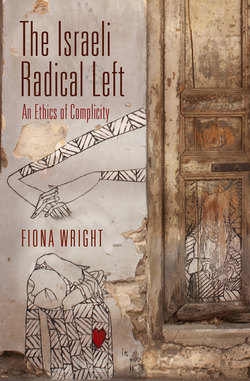Читать книгу The Israeli Radical Left - Fiona Wright - Страница 9
На сайте Литреса книга снята с продажи.
ОглавлениеA NOTE ON LANGUAGE
Comparisons to other places and times are a matter of much sensitivity among Jewish Israelis, as a pervasive anxiety about the “outside world,” and how Israel is seen by it, is grafted onto memories and narratives of the historical experiences of persecution and oppression of Jews. Words such as apartheid or fascism used in relation to contemporary Israeli politics provoke anger and heated debate even among those activists who themselves sometimes employ them to describe their surroundings (cf. Grinberg 2009). With the power of such comparisons and vocabularies in mind, and an awareness of their ethnographic import in the place about which I write, it is helpful to think about the challenges of writing about Israel/Palestine with Vincent Crapanzano’s account of the experience of white South Africans in the later days of apartheid, Waiting, in mind. Reflecting on the use of particular words, those words’ entwinement in ideology, and the inevitable effect this has on ethnographic writing, Crapanzano quotes Jane Kramer writing in the “New York Review of Books”:
The languages of South Africa have been consonant with race and caste, owner and worker, citizen and servant, for so long that language itself—the language one speaks and writes—is a weapon there, quite apart from those details of identity and ideology with which it happens to coincide. Words smother, sacrifices to apartheid, in the closed context of the expectations they arouse. They can sanction such perverse exaggerations, such profound contempt, that anyone who wants to write in South Africa is left with the home truth that language has lost its metaphoric flexibility and assumed, instead, a kind of brute synecdochic power. By now, to write in South Africa is by definition political. (Kramer 1981, cited in Crapanzano 1985: 28)
As such, Crapanzano notes, his use of terms such as “white,” “black,” “coloured,” and so on, is necessitated by his attempt to write the particular political arena at hand, and one can only reproduce certain powerful—sometimes uncomfortable or, quite simply, racist—constructions of reality in doing so. The same linguistic restraints present themselves to anyone writing about Israel/Palestine and one finds oneself constantly stumbling over which word or phrase to use while writing about particular people or places. It is with the acknowledgment that words are not neutral, especially in a place where decisions to use certain words over others, or to describe the political situation in a particular way, have clear political effects, that I take responsibility here for using certain words, and not others, while being clear that my writing will always be restrained by the politics of language and by the need to give an ethnographic, and not a legalistic or objective, account.
Thus while I often refer to Israel/Palestine to underscore the intermeshing ethical, political, and historical space that encompasses the internationally recognized state of Israel as well as the occupied Palestinian areas of the West Bank and the Gaza Strip, I sometimes use only the word Israel. This is for the sake of brevity as well as to emphasize the predominantly “Israeli” spaces and worlds in which I was involved, and the word Israeli here is meant to imply also “Jewish.” I did not only interact with Israeli Jews, but I sought to understand the experience of Jewish Israeli left radical activism and, as such, lived a particular kind of Jewish Israeli life during my research. My decision to use the term “Palestinian citizens of Israel,” or “Palestinian Israeli,” however, rather than the more common “Israeli Arab” or just “Arab,” when I refer to those Palestinians whose parents or grandparents were granted Israeli citizenship but placed under military rule until 1966, marks the particular kind of politics my language seeks to convey. The use of the noun “Arab” is considered by many Palestinians and most of the activists with whom I worked to be part of a Zionist erasure of Palestinian history. Further, my identification of my activist interlocutors as “Jewish Israeli” must be broken down into two further problematic labels—Ashkenazi and Mizrahi, referring to Jews of western European origin and Jews whose origins are in predominantly Muslim and Arabic-speaking countries. Both terms essentialize and homogenize diverse groups of people but are necessary to relate the ethnic and class segregation in contemporary Israel that sees Mizrahi citizens as less powerful, less privileged, and less represented in official political domains than their Ashkenazi counterparts.
Finally, the names and identifying features of most of those whose lives and words appear on the following pages have been changed to protect and respect my interlocutors’ safety and privacy. Sometimes, when discussing public figures or statements made in public forums, I have judged it necessary for analysis or ethically appropriate to use real names. Ultimately, I have sought to represent sensitively and safely the political lives and intimate worlds of others, while bearing in mind the difficulties and dangers that writing can pose.
